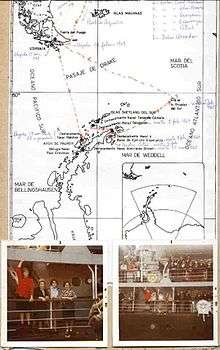Irene Bernasconi
Irene Bernasconi (29 September 1896 – 7 July 1989) was an Argentine marine biologist specializing in Echinoderm research and best known for her work in the Antarctic.[2] She was the first echinoderm specialist in Argentina and spent 55 years conducting research into echinoderms found in the Argentine Sea. Her main focus was sea stars however she also conducted research into brittle stars and sea urchins.[1]
Irene Bernasconi | |
|---|---|
 | |
| Born | Irene María Bernasconi 29 September 1896 |
| Died | 7 July 1989 (aged 92) |
| Nationality | |
| Occupation | Marine biologist |
| Years active | 1924-1984[1] |
Work

Over the course of her career, Bernasconi described a number of new genus and species. Her first taxonomic publication, in which new species from the genus Pteraster were described, was published in 1935. In 1941 she described two new species from the genus Luidia. Between 1937 and 1980, Bernasconi revised the taxonomy of a number of families: Pterasteridae, Luidiidae, Odontasteridae, Gonisasteridae, Ganeriidae, Asterinidae and Echinasteridae. In 1965 she described the new genus of Vemaster along with four new species.[1]
Bernasconi was one of the first female Argentinean scientists to conduct research in Antarctica after travelling there in 1968, at the age of 72. She was accompanied by three other scientists Microbiologist Maria Adela Caria, Marine Biologist Elena Martinez Fontes and Botanist Carmen Pujals.[3]
References
- Alvarado,Juan José; Solis-Marin, Francisco Alonso (2012). Echinoderm Research and Diversity in Latin America. Springer Science & Business Media. p. 360. ISBN 9783642200519.
- "Bernasconi; Irene (1896-1989); Marine biologist". Natural History Museum. Retrieved 24 October 2015.
- Riffenburgh, Beau (2007). Encyclopedia of the Antarctic, Volume 1. Taylor & Francis. p. 1094. ISBN 9780415970242.